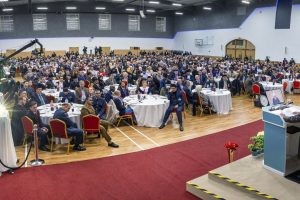
Reehana Shah, USA
On Tuesday, November 3rd, one of the most contentious elections in recent history will take place. On one hand is the incumbent, Donald Trump, and on the other, former vice-president, Joe Biden. The road to this election has been interesting for both candidates to say the least. From heated and unruly debates, attacks on policies and even personal matters being brought to light – all in the midst of a global pandemic and rising social injustices in America. This election has captivated not only Americans, but the entire world. Regardless of which candidate people may support, and despite concerns regarding the voting process due to health and safety restrictions, the message to all Americans has been clear; ‘Vote!’ The exercise of this right is being emphasized now, more than ever before, in what many are calling the most crucial presidential election in American history.
The turbulence, uncertainty, and anxiety that has accompanied this election would make one assume that this scenario is playing itself out in some far-flung corner of the world, but shockingly, this is the current situation facing Americans as they head to the polls this week.
Much of the fear and anxiety surrounding this election is well founded. American politics have always been controversial; however in recent years, many Americans have felt that certain new policies are cruel at best and have been specifically aimed at marginalized groups. Some will argue that this was always America, the veneer of truth has merely been ripped off. Others will say that a combination of rising inequalities, voter apathy, corporate lobbyists, and a removal of protections have led us into this mess.
However, politics is only as good as the people elected۔ When electing a leader from a field of candidates, what are the qualities that should be looked at? What makes a good leader? Should it be the voters who set the national agenda through the leaders they elect, or should the chosen leader steer the country based on his or her knowledge, expertise, and the trust given?
From an Islamic perspective, leadership is a sacred trust. In chapter four of the Holy Qur’an, Allah says:
‘Verily, Allah commands you to make over the trusts to those entitled to them, and that, when you judge between men, you judge with justice. And surely excellent is that with which Allah admonishes you! Allah is All-Hearing, All-Seeing.’ [1]
‘Oh ye who believe! Be steadfast in the cause of Allah, bearing witness in equity; and let not a people’s enmity incite you to act otherwise than with justice. Be always just, that is nearer to righteousness.’ [2]
Power should be given to those who truly deserve it, who will make the progress of the nation as a whole their priority, and who will rule with honesty and integrity. This point is further emphasized by the words of His Holiness, Hazrat Mirza Masroor Ahmad (aba), the fifth Caliph and Worldwide Head of the Ahmadiyya Muslim Community, ‘Nowadays members of the public vote for the party they support. They do not look at the person representing the party, whether they are deserving of the role or not. Neither is the voter acting with justice, nor is the person being given authority as a result of the votes acting justly.’ [3]
No other figure embodies this trust better than the Holy Prophet Muhammad (sa). Even his fiercest enemies, those who wished nothing but death on him, were forced to admit to his high morals and integrity as a leader. Well before his claim to prophethood, Muhammad (sa) was known as sadiq, the truthful, and amin, the trustworthy. His leadership inspired unwavering trust and his followers never doubted his intentions. [4]
These high standards of leadership stand in stark contrast to the current situation in the United States, and it is easy to understand why there is so much apathy surrounding elections and so much despair. However, as Americans, it is critical that we exercise our democratic right and vote in every election, at every level. This is the most effective way to bring about true and meaningful change.
His Holiness, Hazrat Mirza Masroor Ahmad (aba) has emphasized the exercising of this right:
‘The real way to affecting change requires a more astute way to pressure the authorities. For example, every member should be mobilized to use their civic and democratic rights, rather than staying at home on election days. They, in turn, should encourage other citizens that if they want to affect change then they should take part in the democratic process, at all levels, as this is the means to bring change and vote in people who will further their rights and causes.’ [5]
The right to hold elected officials accountable can only come when citizens actively vote and take part in a democracy. The fourth Caliph of the Ahmadiyya Muslim Community, Hazrat Mirza Tahir Ahmad (rh) also warned against complacency and discouraged American Ahmadi Muslims from abstaining or failing to vote:
‘Again, a trust must be discharged in good faith. Therefore, every voter must participate fully in exercising his vote during the elections unless he is unable to do so. Otherwise, he will have failed in the discharge of his own trust. The concept of abstention or refraining from exercising the vote, as happens in the USA where reportedly almost half the electorate actually bothers to vote, has no room in the Islamic concept of democracy.’ [6]
The outcome of this election could fundamentally change the principles of democracy for years to come. The right to vote fully and freely is a crucial part of the democratic process and a principle that Islam fully supports. If democracy truly is of the people, by the people, and for the people, then the right to vote must be exercised by every citizen, at every level.
Reehana Shah is a Canadian-American currently living in the United States. She holds a BA Honours in International Studies, Cooperation and Conflict, and Russian Studies and is a part of the Review of Religions online team. She recently voted in her first American presidential election.
ENDNOTES
- The Holy Qur’an, chapter 4, verse 59.
- The Holy Qur’an, chapter 4, verse 9.
- “An enlightening audience: Jamia UK graduates in the blessed company of Huzoor”, Asif M. Basit, www.alhakam.org, 2ndNovember 2020.
- Our Beloved Master, Sheikh Muhammad Ismail Panipati, pg. 86.
- Letter from Huzoor (aba) to Ameer Sahib USA, June 2020.
- Islam’s Response to Contemporary Issues, Hazrat Mirza Tahir Ahmad, pg. 189.




Add Comment